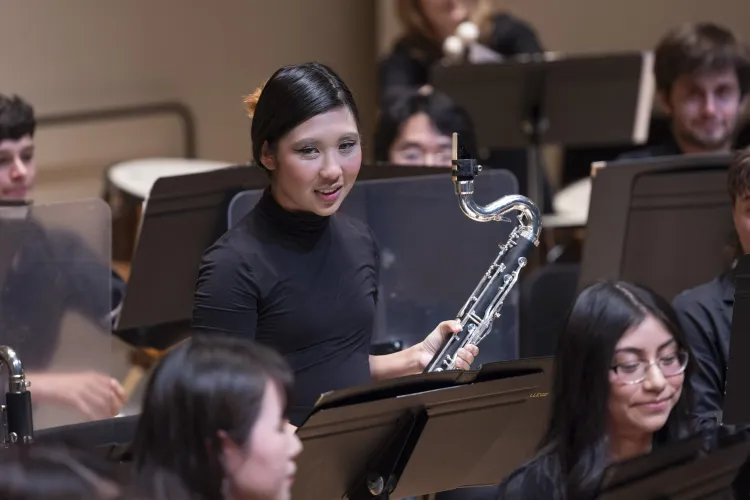Dessa Caguioa ‘24

Dessa Caguioa ‘24 performing with the Swarthmore College Wind Ensemble
Dessa Caguioa ‘24’s musical journey began in an unlikely place. “It started with the animated kids show Little Einsteins and snowballed from there,” she says. “I really wanted to be the kid in the show who could play all the instruments.”
After discovering a musical conservatory in her neighborhood mall, she convinced her mother to enroll her in piano lessons. By high school, she’d joined the marching band. “My friends in Hawaiʻi all knew how much I loved music,” she says. Coming into Swarthmore, however, she wasn’t sure that music was an option. “I was actually planning on being a Japanese major . . . I didn’t think doing music at Swarthmore was possible back then,” she says. “I knew Swarthmore didn’t have a marching band program there and I was joining during the height of the pandemic.”
After exploring Japanese and Sociology & Anthropology classes, Caguioa took Music 11 (Harmony, Counterpoint, and Form) with Professor Jon Kochavi. “This was what made me think ‘Oh, I can really stick with this.’” It was her introduction to the program and what began her involvement with music at Swarthmore. Since then, she’s been a part of the Wind Ensemble, Chorus, and Garnet singers, and she’s composed original works, finding fulfillment in the creative expression that the process enables.
“There’s a real lack of non-cis male composers,” Caguioa says, “so having people willing to support you even though you may be the only fem[sic] composer is amazing.” For her, the most endearing aspect of the Swarthmore music department is the warmth and acceptance from the faculty and students. She described her experiences with imposter syndrome, feeling under-represented, and struggling to find where she belonged. “I needed the trust of those around me,” she says, “and I found that at Swarthmore.”
Her works have included arrangements of Hawaiʻi Aloha and The Last Rose of Summer, performed by the Garnet Singers and Wind Ensemble respectively, and the original composition, Journey, for organ, performed by Mark Loria as part of the Composer’s Showcase. Two more of her original works, Homeward and Elegy, will be performed this spring by the Wind Ensemble and the Garnet Singers.
The core of Dessa’s musicianship revolves around music composition. She enjoys being left to her own devices so she can pour her emotions into her work. “I love composing, but that’s often a solitary activity,” she muses, “and it gets lonely sometimes.” She supplements her composing with collaborative performances with other musicians.
“I took ‘Music, Space, and Place in Medieval Europe’ a year or two ago,” she remembers fondly, “and I got to sing in European cathedrals with the other students.” Having this sense of community within the College helped her develop her art and kept the aspects of composition and performance balanced.
Watching her pieces be performed can be a conflicting experience for her. “It’s very difficult sometimes,” she says. “It’s like watching others interpret a part of yourself.” Caguioa finds that for her, the pieces she writes are filled with emotion. It’s elating to have her work performed, but can be nerve wracking watching others express her personal feelings in their performance. “What role does the composer play in the music-making process?” she asks. “Yes, they compose the music, but do they really have control over how it’s performed?”
After graduation, Caguioa is hoping to go to the University of Hawaiʻi at Manoa in the music composition program. “I want to watch over my little sister,” she says, “and I want to take time further building up my composition portfolio.”
At the end of her journey, she looks back on her time at Swarthmore fondly. “The fact that I was given a space to explore composing to its fullest, that was this program’s biggest strength. It’s not imposing itself on anyone.”
-
Favorite music course at Swarthmore: Conducting and Orchestration with Andrew Hauze.
Favorite music-making experience at Swarthmore: Being in a practice room or in Underhill writing out a melody on Sibelius.
What you’ll miss most about Swarthmore: Hanging out in Jon Kochavi’s office for no reason.
What sound or noise do you love: Choirs singing chords in unison or really low bass notes.
What sound or noise do you hate: People yelling, especially when it's directed at me.
What's the last song you played on your phone: “Queen of Nothing” by The Crane Wives



